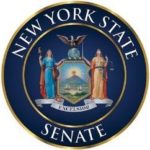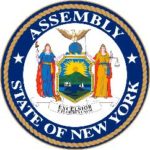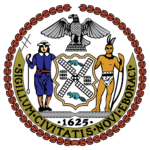In the News – New York State
 Governor & Legislature Agree on Revenue Figures
Governor & Legislature Agree on Revenue Figures
State’s Budget Process Moves into Next Stages
The Executive, Senate, and Assembly this week reached consensus on the State’s available revenue for FY21 and FY22, recognizing $2.5 billion in additional revenue over the two-year period and setting the parameters for the 2021-2022 New York budget due April 1st.
The agreement was struck through the consensus revenue forecast process, a step in the annual budget-making through which the Executive and the Legislature agree on economic predictions and the revenue those predictions will provide. Through the agreement, about $1 billion in additional revenue will be recognized in the current fiscal year that ends March 31 and about $1.5 billion in next fiscal year.
Under the agreement, the Executive and Legislature agree payroll employment in New York State will increase by 8.8 percent in Fiscal Year 2022, which starts April 1, following a 12.1 percent decline in the current year, Fiscal Year 2021. Personal income growth is expected to 6.5 percent for FY 2021 and 2.8 percent for FY 2022 and wage growth is projected to be 6.4 percent for FY 2022, following a decline of 2.6 percent for FY2021.
The State is still grappling with a $17.5 billion COVID-driven shortfall, $15 billion of which it has requested from the federal government. With the federal stimulus package nearing finalization, New York’s full revenue stream will soon be much clearer.
“Revenues coming in higher than expectations is good news, but we’re still contending with devastating revenue losses caused entirely by the pandemic that we need the federal government to offset so we can continue to fund baseline services over two years,” State Budget Director Robert Mujica said. “These new revenues will be used to reduce the deficit in the out-years after the federal funding is no longer available.”
Armed with these figures, the Senate and Assembly will fine-tune their respective one-house budgets which are projected to be released next week. The budget conference committee process follows with both houses working toward consensus and passage by the April 1st deadline.

 Legislature Passes Legislation to Scale Back Governor’s Emergency Powers
Legislature Passes Legislation to Scale Back Governor’s Emergency Powers
The State Senate and Assembly today passed legislation to scale back Governor Andrew Cuomo’s temporary emergency powers that were granted at the start of the COVID-19 pandemic. The bill repeals the initial broad authority and replaces it with strict parameters to limit the scope of the directives, ensure legislative and local notification of any new or revised directives, and increase transparency regarding directive specifics and necessity.
All current directives pertaining to preserving the public health will continue, according to Senate Majority Leader Andrea Stewart-Cousins and Assembly Speaker Carl Heastie.
At the beginning of the COVID-19 pandemic, the New York State Legislature passed legislation (Chapter 23 of the Laws of 2020) to give the Governor broad emergency powers that were set to expire on April 30.
Under the legislation (S5357/A5967), sponsored by Senate Majority Leader Stewart-Cousins and Assembly Speaker Heastie, standing directives taken by executive action which manage the spread or reduction of COVID-19, facilitate the vaccination process or require use of face coverings, will remain in effect for an additional 30 days. While these can then be extended or modified, the governor will be required to notify relevant Senate and Assembly committee chairs as well as the temporary president of the Senate and the speaker of the Assembly with the need for the extension or modification, and the threat to public health and safety, and provide an opportunity to comment. The governor cannot extend actions beyond the first 30 days unless they explicitly relate to the COVID-19 pandemic.
Directives can be modified to revise the number of individuals, businesses or entities impacted by an executive order – for example individuals eligible for vaccination or seating capacity of a business. Directives will not be continuously modified or extended unless the governor has responded to comments provided by the chairs of relevant committees.
Where a local government in the state is exclusively impacted by an ongoing executive action, the local government leadership will also receive notice and an opportunity to comment on the continuation or modification.
Fifteen days after the legislation goes into effect, all current suspensions and directives will be posted on the website of the governor in a searchable format, and include details on such suspensions and directives, including the public health and safety reasons any directives were extended or modified. Every 30 days after, the website will be updated to include responses to written comments or information requests from relevant committee chairs or municipal government entities.
The legislation will also allow the Legislature to repeal a declared State of Emergency by joint resolution.
The bill now goes to Governor Cuomo for consideration.
 COVID-19 UPDATES
COVID-19 UPDATES
Domestic Travel
➢ Domestic travelers to New York State who have been vaccinated no longer have to quarantine or test out within 90 days of their full vaccination.
Residential Gatherings (March 22)
➢ Residential gatherings of up to 25 people can be held outdoors.
➢ Indoor residential gatherings remain capped at 10 people to reduce the continued risk of spread. Also, non-residential social gatherings of up to 100 people can occur indoors and up to 200 people can occur outdoors.
Event, arts, and entertainment venues (April 2)
➢ Can reopen at 33 percent capacity, up to 100 people indoors and up to 200 people outdoors.
➢ If all attendees present proof of negative test prior to entry, capacity can increase up to 150 people indoors and up to 500 people outdoors.
➢ Social distancing and face coverings will be required by all attendees, as well as strict adherence to all applicable Department of Health guidance.
In the News – City
 NYC Announces New Measures to Hold Landlords Accountable for Dangerous Conditions
NYC Announces New Measures to Hold Landlords Accountable for Dangerous Conditions
New Department of Buildings regulation blocks owners of residential buildings with a high proportion of hazardous violations from obtaining new construction permits
Mayor Bill de Blasio and Department of Buildings (DOB) Commissioner Melanie La Rocca this week announced new restrictions for landlords with multiple violations for unsafe or hazardous conditions.
According to the Mayor, this new measure allows DOB to deny new construction permit applications at properties where landlords may be using poor building maintenance as a tool to harass their tenants.
DOB will create and maintain a list of multiple dwellings in New York City with excessive, open, and hazardous DOB and Housing Preservation and Development (HPD) violations in relation to the number of residential units. The list will be updated daily. Buildings placed on this list will be prevented from obtaining new permits until the violations are resolved and the conditions are corrected, except in situations where permits are necessary to correct a violation or other select circumstances.
“We are looking out for tenants and pushing landlords to take responsibility for their properties,” said Buildings Commissioner Melanie E. La Rocca. “This new measure sends a clear message to bad actors: No more business as usual. It’s past time to bring your existing buildings into compliance and derelict buildings up to code.”
The permit restriction, which began this week, will apply to violations issued on or after January 4, 2020, the date Local Law 104 of 2019 went into effect. Restrictions will address violations that have not been certified as having been resolved with DOB or cleared by HPD. The permit denials will be applied to buildings with the following ratios of violations to dwelling units:
➢ Buildings with 35 or more dwelling units and two or more violations for every unit;
➢ Buildings with fewer than 35 dwelling units and three or more violations for every unit.
The permit restrictions will also be applied to submissions in the Department’s DOB NOW portal in the near future.
Briefs
Regulations Adopted to Accelerate Renewable Energy Projects Across New York State
The Office of Renewable Energy Siting has adopted new regulations to accelerate the siting and construction of major renewable energy facilities across New York State.
According to Governor Andrew Cuomo, projects advanced under the new regulations, which are part of the Accelerated Renewable Energy Growth and Community Benefit Act, will help the state combat climate change and jumpstart its economic recovery from the COVID-19 pandemic.
The Act and its implementing regulations will also drive progress toward New York’s clean energy and climate goals — including the directive to obtain 70 percent of the state’s electricity from renewable sources by 2030 — as required under the state’s Climate Leadership and Community Protection Act.
NYS Releases RFP to Develop Javits “Site K” on Manhattan Far West Side
Governor Andrew Cuomo this week announced that a Request for Proposals for the commercial or mixed-use development of 418 11th Avenue is now open.
The approximately 1.2-acre site, referred to as Site K, is owned by the New York Convention Center Development Corporation – an Empire State Development subsidiary – and is located directly east of the main entrance to the Jacob K. Javits Convention Center, which is currently undergoing a $1.5 billion, 1.2 million square-foot expansion. Bounded by 35th and 36th Streets, and 11th Avenue and Hudson Boulevard West, Site K is directly across from the Javits Center and one block from the High Line, the #7 subway line, Hudson Yards and Hudson River Park.
Respondents may propose a commercial or mixed-use development, including hotel uses that are complementary to the Javits Center. Any proposals that include residential use must include 30 percent permanently affordable units as outlined in the RFP and in compliance with the Affordable New York program.
Submissions are due by Thursday, May 6, 2021 at 2:00 p.m. The RFP and additional information about the process is available on Empire State Development’s website here, and questions should be directed to JavitsSiteKRFP@esd.ny.gov.
City Begins Vaccination for Homebound New Yorkers
With the arrival of the Johnson & Johnson vaccine, the City’s effort to vaccinate homebound New Yorkers is now officially underway, Mayor de Blasio announced this week.
The City of New York is partnering with the Department for the Aging and Medicaid Health Plans to call thousands of homebound seniors who will be referred to a new city-run initiative to provide vaccinations in the home. FDNY will deploy field teams with nurses to vaccinate older adults aged 65 and older in select residential buildings identified by DFTA and HPD starting this week through next week.
Five teams are being deployed to vaccinate the first round of older adults Thursday and Friday at Co-op City in the Bronx and Brighton Beach respectively. This effort will scale up to 30 teams vaccinating 240 clients per day by the week of March 15.
NYPD Launches Graffiti Remediation Program
New York Police Department is launching an effort to combat the increase in graffiti across New York City.
The NYPD’s new program will pair police officers with community volunteer groups to execute cleanups around the city beginning April 10, NYPD Chief of Patrol Juanita Holmes said.
Last March, City officials suspended a $3 million remediation program, Graffiti Free NYC, that provided property owners with graffiti removal funded by the city. That program, begun in 1999, was canceled due to budget shortfalls, according to city officials.
Mayor de Blasio Appoints Nancy Pascal as Director of the Office of Faith and Community Partnerships
Mayor Bill de Blasio this week appointed Nancy Pascal as the Director of the Office of Faith and Community Partnerships.
Ms. Pascal recently served as the Faith Constituency Manager for the City’s 2020 Census effort and as Citywide Faith Community Coordinator for the Mayor’s Community Affairs Unit. As Director of the Office of Faith and Community Partnerships, Pascal will ensure that communities at all levels have access to City Hall through outreach, education, and engagement.
She began her career in public service as a community organizer and Brooklyn representative for then-Public Advocate Bill de Blasio.
Teamsters Local 237 Asks New Yorkers to Help Keep Safety Agents in Schools
Teamsters Local 237 President Gregory Floyd is taking his fight against a City Council proposal to move School Safety Agents from the New York Police Department (NYPD) to the Department of Education (DOE) to New Yorkers, asking them to voice their opposition to the plan which will put the City’s school children and personnel at risk.
School Safety Agents provide security and ensure the safety of students, faculty, and visitors in the New York City Public School buildings and surrounding premises by patrolling and operating scanning equipment, verifying identity and escorting visitors, and by challenging unauthorized personnel.
The City Council legislation transferring the authority of School Safety Agents from the NYPD to the DOE would greatly reduce their safety duties and programs. In addition, some elected officials propose to totally eliminate the safety agents from schools.
Teamsters 237 is circulating the below petition asking New Yorkers to support the invaluable services of the School Safety Agents by opposing moving School Safety Agents from NYPD to DOE.
——————————–
Petition in Support of School Safety
During 2018 and 2019, New York City School Safety Agents confiscated 2,701 weapons that were being brought into schools. Yet, the New York City Council is currently gambling with the safety of our children by proposing a bill to transfer School Safety Agents from the NYPD to the Department of Education. The legislation would limit the effectiveness of the 5,038 School Safety Agents, 70 percent of whom are women, mostly Black and Latinas.
Some City Council Members are even advocating to fully eliminate School Safety Agents, who have provided extraordinary service, keeping our one million students out of harm’s way. Parents and other New Yorkers rightfully demand that we protect our children by keeping our school safety agents. I strongly oppose moving School Safety Agents from the NYPD to the DOE, and I strongly urge the NYC Council to abandon this plan. Keep School Safety Agents in the NYPD. Protect our children.
——————————–
Teamsters Local 237 represents 24,000 New York public employees who work in New York City government agencies and in municipalities, libraries and schools on Long Island. Local 237 is the largest local union in the Teamsters international union (International Brotherhood of Teamsters).
Coming Up
New York State
Monday, March 8th
Senate Standing Committee on Alcoholism and Substance Abuse, Online Meeting, (https://www.nysenate.gov/), 10:30 a.m.
Senate Standing Committee on Civil Service and Pensions, Online Meeting, (https://www.nysenate.gov/), 11:00 a.m.
Senate Standing Committee on Codes, Online Meeting, (https://www.nysenate.gov/), 11:30 a.m.
Assembly Session, NYS Capitol Building, Online Meeting, (https://www.nyassembly.gov/), 2:00 p.m.
Senate Session, NYS Capitol Building, Online Meeting, (https://www.nysenate.gov/), 3:00 p.m.
Tuesday March 9th
Assembly Standing Committee on Correction, Online Meeting, (https://www.nyassembly.gov/), 9:00 a.m.
Assembly Standing Committee on Racing and Wagering, Online Meeting (https://www.nyassembly.gov/), 9:30 a.m.
Senate Standing Committee on Budget and Revenue, Online Meeting, (https://www.nysenate.gov/),
9:30 a.m.
Assembly Standing Committee on Economic Development, Online Meeting, (https://www.nyassembly.gov/), 10:00 a.m.
Senate Standing Committee on Judiciary, Online Meeting, (https://www.nysenate.gov/), 10:00 a.m.
Assembly Standing Committee on Social Services, Online Meeting, (https://www.nyassembly.gov/), 10:00 a.m.
Senate Standing Committee on Procurement and Contracts, Online Meeting, (https://www.nysenate.gov/), 10:30 a.m.
Senate Standing Committee on Housing, Construction and Community Development, Online Meeting, (https://www.nysenate.gov/), 11:00 a.m.
Assembly Standing Committee on Housing, Online Meeting, (https://www.nyassembly.gov/), 11:30 a.m.
Senate Standing Committee on Health, Online Meeting, (https://www.nysenate.gov/ ), 11:30 a.m.
Senate Standing Committee on Cities 1, Online Meeting, (https://www.nysenate.gov/), 12:00 p.m.
Assembly Standing Committee on Consumer Affairs and Protection, Online Meeting, (https://www.nyassembly.gov/), 12:00 p.m.
Senate Standing Committee on Children and Families, Online Meeting, (https://www.nysenate.gov/), 12:30 p.m.
Senate Session, NYS Capitol Building, (https://www.nysenate.gov/), 3:00 p.m.
Assembly Session, NYS Capitol Building, (https://www.nyassembly.gov/),
Wednesday March 10th
Senate Session, NYS Capitol Building, (https://www.nysenate.gov/), 3:00 p.m.
Assembly Session, NYS Capitol Building, (https://www.nyassembly.gov/),
Thursday March 11th
Senate Session, NYS Capitol Building, (https://www.nysenate.gov/), 3:00 p.m.
Assembly Session, NYS Capitol Building, (https://www.nyassembly.gov/).
New York City
Monday March 8th
Committee on Environmental Protection, Remote Hearing (Virtual Room 2), 10:00 a.m.
Committee on Immigration, Remote Hearing (Virtual Room 3), 11:00 a.m.
Subcommittee on Landmarks, Public Sitings, and Dispositions, (Virtual Room #1), 2:00 p.m.
Tuesday March 9th
Committee on Cultural Affairs, Libraries, and International Intergroup Relations, Remote Hearing (Virtual Room 3), 10:00 a.m.
Committee on Transportation, Remote Hearing (Virtual Room #3), 10:00 a.m.
Wednesday March 10th
Committee on Aging, Remote Hearing (Virtual Room #2), 10:00 a.m.
Committee on Land Use, Remote Hearing (Virtual Room #1), 11:00 a.m.
Committee on Technology, Remote Hearing (Virtual Room #2), 2:00 p.m.
Committee on Criminal Justice, Remote Hearing (Virtual Room #3), 2:00 p.m.
Thursday March 11th
Committee on Youth Services, Remote Hearing (Virtual Room #1), 9:00 a.m.
Committee on Governmental Operations, Remote Hearing (Virtual Room #2), 1:00 p.m.
Friday March 12th
Committee on Parks and Recreation, Remote Hearing (Virtual Room 1), 10:00 a.m.
Committee on Public Housing, Remote Hearing (Virtual Room #2), 1:00 p.m.
